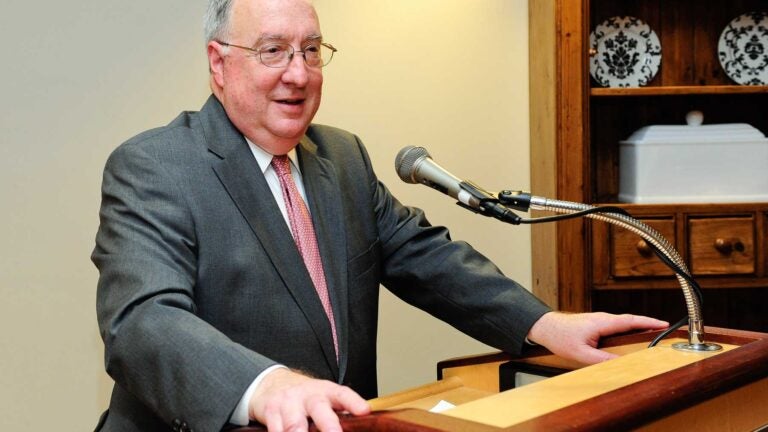
Philip Seib does research on how media coverage affects foreign policy and diplomacy. (USC Photo/Gus Ruelas)
USC scholar looks at the future of diplomacy
Philip Seib explores how social media and new communication tools have shifted the ways in which diplomacy is conducted
Noted scholar and writer Philip Seib has authored and edited numerous books related to his research on how media coverage affects foreign policy and diplomacy.
He is a professor of journalism, public diplomacy and international relations at the USC Annenberg School for Communication and Journalism who served as director of the USC Center on Public Diplomacy from 2009-13.
His latest book, The Future of #Diplomacy, explores how social media and new communication tools have shifted the ways in which diplomacy is conducted. In the introduction to the book, Seib reminds us that until just a decade or two ago, diplomacy was “the domain of an insular elite” where diplomats worked in a closed-door environment, “speaking just to one another and paying little heed to those publics whose future might be shaped by their work.” Today, as the result of “media-based empowerment of the public,” Seib says that citizens are better informed about diplomatic activity and have more opportunities to make their voices heard.
When and how did you first become interested in social media as a tool for diplomacy?
As the use of social media increased around the world, it seemed to me that the field of diplomacy was not keeping up with these media-related changes in the global political environment. Diplomacy has traditionally been a cloistered enterprise, but social media exert pressure for transparency and for empowerment of groups and individuals who now expect to be included in that enterprise. The results of this process — a “clash of cultures” of sorts — are fascinating.
How do you incorporate discussions about social media when teaching public diplomacy? For students who aspire to become diplomats, is it necessary to learn the technical skills needed for digital communication?
Topics related to social media are now incorporated in almost all discussions of contemporary diplomacy, whether the particular issue relates to the work of diplomats or to the ways that the public plugs into information about foreign affairs. Even discussions about past international events have a social media facet: How might things have been different if social media had been available at that time? A good example: the Rwanda genocide of 1994. Students who aspire to be diplomats should be familiar with the ways that new media can be used as diplomatic tools. If they don’t know about this, they will find themselves uncomfortably distanced from publics that rely increasingly on these media.
Are there any negative sides to the “media-based empowerment of the public” that you describe in the book?
The realities of diplomacy are such that they are not always compatible with the openness of the new media era. Consider, for example, the negotiations between the United States and Cuba that led to the new relationship between the two countries. Those negotiations could not have been conducted in public view and with ongoing commentary on social media. If they had been, political pressures — many emanating from social media discourse — would have scuttled the entire process. So we will be watching a sometimes uneasy relationship between the growing community of social media users and those who recognize that transparency in diplomacy cannot be unlimited.
How do you rate the social media prowess of today’s diplomats and politicians? Who’s doing it right, who’s doing it wrong?
The diplomatic corps of most countries are still struggling with this process. Who should have authority to use social media? What kind of vetting process should be created? How should listening and responding be handled? Answers to such questions are slowly developing. Perhaps the most crucial use of social media in foreign affairs today is in counterterrorism. Islamic State has proved itself highly adept at using social media for recruiting, training, fundraising and other matters. Its foes, including the United States, are finally beginning to catch up in terms of skill level.
Where do you see this culture of digital communication in five to 10 years? Is Twitter here to stay?
When you consider that the “social media revolution” has taken place within the space of a decade, you get a sense of how difficult it is to predict the future of such matters. Ten years from now, Twitter might be like the Beatles — fondly but hazily remembered.
How much time do you spend on Twitter per day? How important is social media in your day-to-day life?
I usually tweet interesting material I come across in sometimes obscure news reports, but I do not spend an inordinate amount of time on Twitter. I like to pretend that I have a life.
